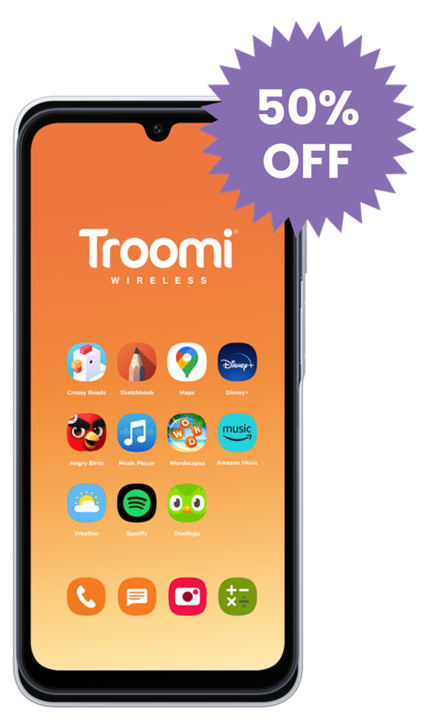After you decide when to give your child their own cell phone, what’s the next step? Teaching them how to use it in an appropriate, responsible, and healthy way, of course!
Now, that’s a lesson that can take years to teach. But if you’re looking for the starting line, check out our top ten cell phone rules for kids!
1. Take It Down a Notch
Remind your child that whether they’re out and about in public or at a sleepover with friends, it’s inconsiderate to play music, watch videos, or make speaker phone calls at full volume.
In addition to pulling your child’s attention away from their in-person activities, these loud noises create disruptions that often frustrate those in earshot.
Encourage your child to make a habit of keeping headphones in their pocket. That way, they can listen to music and take video calls without disturbing others! Better yet, your child can silence their phone and use it later. Instead, they could soak in their surroundings without their technology in hand!
2. Ask First, Download Second
Come to an agreement with your child that before they can download any apps, they need to approach you about them first. Tens of thousands of apps are advertised and classified as appropriate for children, but in reality are riddled with risks:
- Concerns about data security and children’s privacy.
- Loopholes for accessing the Internet and inappropriate content.
- Functionality to connect and chat with strangers.
- Potential to cause depression, low self-esteem, addiction, and other problems.
It’s best for your child to ask permission prior to tapping “download” on an app. That way, you can check out the app yourself and determine if it’s a-okay for your kiddo!
3. It Can Wait Until Morning
Teach your child that unless it’s urgent, their text or call can wait. Just like you wouldn’t knock on your neighbor’s door after 9:00 PM, there are times throughout the night when dropping a line is less than ideal.
Chat with your child about common courtesy and come up with an appropriate time window for texts and calls. If you could use a little help with reinforcements, swap out your kiddo’s smartphone for Troomi!
With Troomi, you can set limits on the functionality of your child’s phone. Turn off the phone at certain times to keep your kiddo from contacting anyone after hours. Click here to learn more!
4. Face-to-Face Communication Comes First
Remind your child that when they’re in the presence of other people, those interactions will always be more important than what’s happening on their phone.
Whether they’re gathered around the dinner table with family or the lunch table at school with friends, your child should keep their tech tucked away. What’s on their phone can wait—real-life conversation and connection with loved ones can’t be beat!
5. Not Too Cool for School
With cell phones becoming more and more common for kids, it’s standard for schools to have cell phone policies in place.
Check with your child’s school for more information on their cell phone rules and consequences. Then, make it clear to your child that you support their school’s expectations—and any disciplinary action that could come if those expectations aren’t met.
Regardless of official rules, discuss with your child the ways that their cell phone use in the classroom could be disrespectful. Together, the two of you can come up with your own set of cell phone guidelines!
- Advise your child to keep their phone in their backpack and turn off any notification sounds. They shouldn’t use their cell phone during class unless the teacher grants permission. Playing games, taking pictures, and texting while others are talking is rude!
- Remind your child not to take pictures of classmates and peers without their knowledge or permission.
- Schools often block the use of certain apps and websites. Even if your child is trying to access something they can safely access at home, schools try to be a distraction-free environment. Remind your child to respect those restrictions and avoid looking for loopholes.
6. Keep It Real
If we all behaved online the way we do in the real world, the Internet might be a better place! Teach your child that if they wouldn’t say something in person, they shouldn’t text it or share it on social media.
7. Time and Place Matter
Chat with your child about appropriate cell phone use. This includes not only the responsible use of their phone’s functions and features, but when and where they should or shouldn’t use their cell phone.
It may help to establish phone-free times and places for the whole family—yourself included! Consider limiting phone use when you or your family are
- At the dinner table
- In the classroom
- During family parties
- At movie theaters, restaurants, and other public places
- Before bedtime
8. Not a Right, but a Privilege
When it comes down to it, your child doesn’t need a cell phone. In fact, none of us do! We all lived without them before—and we could do it again. (If we had no other choice, of course.)
Make sure your child is aware that having their own phone is not a right. It’s a privilege! And it’s a privilege that can be taken away, if necessary.
9. Put It in Writing
Speaking of taking privileges away, it’s important that your child understands your expectations when it comes to their cell phone use. When your expectations are clear, your child won’t be surprised by any consequences that come from violating rules.
To facilitate an agreement between you and your child about their cell phone use, check out this cell phone contract! Putting your terms in writing will hold the both of you accountable to your agreement.
10. Don’t Forget the Phone Numbers
In case your child’s phone dies, breaks, or gets lost or stolen, they’ll likely need to use someone else’s phone to reach you. Because of this possibility, help your child memorize the most important phone numbers in their contact list:
- Parents’ cell phone numbers
- Parents’ work phone numbers
- Family home landline
- Next-door neighbor’s phone number
It’s also beneficial for your child to know the number of the local police station and, of course, 9-1-1 in case of emergency.
To help your child sort out these phone numbers, download and print this important phone number list!Whatever cell phone rules you choose to implement in your home, Troomi can help. From remote parental controls in our unique Parent Portal to expertly vetted KidSmart® Apps, our kid-friendly phones are supremely safe. Click here to learn more about the phone that grows with your child!


